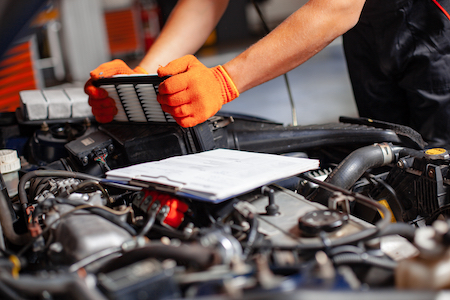The temperatures continue to rise. You know how it impacts your body – you’re more tired, sluggish, and need more hydration to thrive.
Your car performs in much the same way. Heat is a residual form of energy created as your vehicle operates. Too much heat can affect car and truck performance.
While vehicles are designed to dissipate heat energy, environmental heat can have a negative impact on the engine, radiator, air conditioner, tires, and other components. Certain parts are more susceptible to heat. With a little knowledge, you can watch for problems early, and prevent damage before it occurs.
How high temperatures affect car performance
A vehicle is filled with parts that all take on a lot of heat as they perform. It’s built to withstand intense heat. That said, the components can only take so much. When a car moves beyond what it can take, that’s when parts start to break down. Performance is impacted, and that’s where damage can quickly occur. What may start out as a small problem with a part can quickly escalate to full-blown engine damage.
Cars regulate using a mixture of fuel and air. Too much or too little of either can be a big problem. It’s up to the engine control unit to monitor the amount and quality of the air coming in and adjust the fuel accordingly.

Where it changes is in extreme temperatures. Cold air is denser than hot air. In the summer, that means it brings in less concentrated levels of oxygen, which can cause the engine to lose horsepower as it makes up the difference.
All of this can severely affect the performance of your vehicle.
Warm air also holds more water, which further overrides the oxygen. To prevent too much fuel from entering into the system, less fuel is sent into the combustion chamber, and the engine control unit adjusts the timing.
What components are impacted the most?
When the summer months bring high temperatures for days – weeks on end, you may notice your car doesn’t act like it does when days are cooler. While it impacts overall performance, you may also notice problems with particular components. These can include:
Motor oil
Motor oil is used to keep every part in the engine block running well and thoroughly lubricated. One of the most common effects of higher temperatures is on the viscosity of the motor oil.
When temperatures climb, it causes motor oil to reduce viscosity, thinning down. Excess heat from the car’s combustion process and the emissions around the environment can also reduce viscosity. This reduction can cause an increase in friction, which adds even more heat to the process.
One of the best times to get an oil change is early in the summer months as the temperatures start to climb. You can move to a more viscous alternative, and ensure the oil tank is topped off for best results all summer long.
Tires
There’s a reason you see blown tire residuals frequently on the highway on a hot summer day. Tires deal with heat expansion on a hot summer day. As they heat, they expand, which in turn increases the tire pressure.
For cars or trucks that have ever-changing loads, especially when pulling RVs, trailers, etc, the tire can bulge to the point of a blowout. This can lead to losing control of the vehicle, car damage, and severe injury.
Before you head out on the open road, check your tire pressure to ensure it’s within the guideline established by your vehicle’s manufacturer. Check it frequently on your drive.
Batteries
We’re all aware that batteries have a hard time cranking over on the coldest days of the year, but did you know the same is true on the hottest days? Extreme heat can affect batteries by stopping the ionic reaction inside the battery. This means the battery no longer has the proper levels of crank power to turn the engine over as you’re attempting to start it up. It may be from trying to run too many accessories at once, such as fans and air conditioners. It could also be a permanent loss of power, meaning you’ll need to replace the car battery.
Prepare for summertime heat by having the battery tested and checked at the beginning of the season. This will give you a rough idea of how much life is left in the battery, and when you can expect to replace it. If your car battery is old, this gives you a chance to fix it on your terms, rather than face the consequences out on the open road.
Cooling systems
People often confuse a car’s cooling system with the air conditioner. They are, in fact, two separate systems.
The cooling system maintains the temperature of the engine, while the air conditioner keeps the passenger cabin of the car comfortable for the occupants.
To keep the car’s engine compartment running well, it depends on coolant flowing through the system to keep parts operating and in good working condition. Extreme temperatures can slow or stop the process, allowing the engine to overheat, and components to stall or fail.
Overheating often occurs with slow driving conditions, since the air flowing in isn’t strong enough to keep the internal environment cooled. To prevent overheating, ensure coolant is in good working condition, and the reservoir is topped off with high quality fluids.
How your car acts when performance is at stake
Chances are if your car is experiencing problems from high temperatures, you’ll notice it in the performance. You may experience:
- Loud noises coming from the exhaust system
- Difficulty accelerating
- Unable to start the car
- A reduction in fuel efficiency
- A burning smell from the exhaust pipe
If you think you might have performance issues caused by high temperatures, your best course of action is to schedule an inspection, and get to the root cause before more damage occurs.
Are summertime temperatures keeping your car from performing well?
